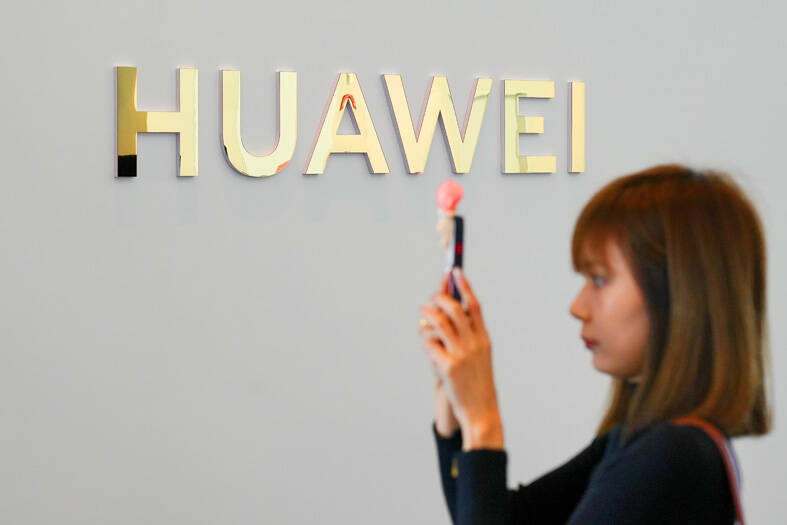Huawei Technologies Co (華為) posted its first quarterly net loss in years after the company spent aggressively on research in areas from electric vehicles (EVs) to chips while the business as a whole slowed.
The Shenzhen-based networking and electronics leader reported a 9.5 percent annual rise in revenue to about 276 billion yuan (US$38.1 billion) in the December quarter last year, according to Bloomberg’s calculations based on annual results.
Huawei took a big step forward in chipmaking and smartphones last year, when it debuted its own fully in-house operating system and began to compete with Nvidia Corp domestically on artificial intelligence (AI) server chips.

Photo: EPA-EFE
Hit by a series of US sanctions, Huawei spent heavily on research and development (R&D).
The company posted a net loss of about 300 million yuan for the December quarter of last year, compared with a net profit of 13.9 billion yuan a year previously when the company recorded gains from previous asset sales.
Overall, the company made a net profit of 62.6 billion yuan last year, down 28 percent from 87 billion yuan in 2023.
A Huawei spokesperson in a statement said that profit slipped last year because it “continued to increase... future-oriented investment and there were no gains from the sale of businesses.”
Huawei said it plowed 179.7 billion yuan into R&D last year, up 9.1 percent from 2023 and about one-fifth of overall revenue.
Revenue last year rose 22 percent year-on-year to 862.1 billion yuan, the highest since the figure surpassed 890 billion yuan in 2020.
Most of that came from its information and communication technology infrastructure business and consumer products — which encompass handsets, wearables and laptops — followed by cloud computing and telecom business.
The results were “in line with forecast,” Huawei’s rotating chairwoman Sabrina Meng (孟晚舟) said in a statement.

‘SWASTICAR’: Tesla CEO Elon Musk’s close association with Donald Trump has prompted opponents to brand him a ‘Nazi’ and resulted in a dramatic drop in sales Demonstrators descended on Tesla Inc dealerships across the US, and in Europe and Canada on Saturday to protest company chief Elon Musk, who has amassed extraordinary power as a top adviser to US President Donald Trump. Waving signs with messages such as “Musk is stealing our money” and “Reclaim our country,” the protests largely took place peacefully following fiery episodes of vandalism on Tesla vehicles, dealerships and other facilities in recent weeks that US officials have denounced as terrorism. Hundreds rallied on Saturday outside the Tesla dealership in Manhattan. Some blasted Musk, the world’s richest man, while others demanded the shuttering of his

ADVERSARIES: The new list includes 11 entities in China and one in Taiwan, which is a local branch of Chinese cloud computing firm Inspur Group The US added dozens of entities to a trade blacklist on Tuesday, the US Department of Commerce said, in part to disrupt Beijing’s artificial intelligence (AI) and advanced computing capabilities. The action affects 80 entities from countries including China, the United Arab Emirates and Iran, with the commerce department citing their “activities contrary to US national security and foreign policy.” Those added to the “entity list” are restricted from obtaining US items and technologies without government authorization. “We will not allow adversaries to exploit American technology to bolster their own militaries and threaten American lives,” US Secretary of Commerce Howard Lutnick said. The entities

Taiwan’s official purchasing managers’ index (PMI) last month rose 0.2 percentage points to 54.2, in a second consecutive month of expansion, thanks to front-loading demand intended to avoid potential US tariff hikes, the Chung-Hua Institution for Economic Research (CIER, 中華經濟研究院) said yesterday. While short-term demand appeared robust, uncertainties rose due to US President Donald Trump’s unpredictable trade policy, CIER president Lien Hsien-ming (連賢明) told a news conference in Taipei. Taiwan’s economy this year would be characterized by high-level fluctuations and the volatility would be wilder than most expect, Lien said Demand for electronics, particularly semiconductors, continues to benefit from US technology giants’ effort

Minister of Finance Chuang Tsui-yun (莊翠雲) yesterday told lawmakers that she “would not speculate,” but a “response plan” has been prepared in case Taiwan is targeted by US President Donald Trump’s reciprocal tariffs, which are to be announced on Wednesday next week. The Trump administration, including US Secretary of the Treasury Scott Bessent, has said that much of the proposed reciprocal tariffs would focus on the 15 countries that have the highest trade surpluses with the US. Bessent has referred to those countries as the “dirty 15,” but has not named them. Last year, Taiwan’s US$73.9 billion trade surplus with the US